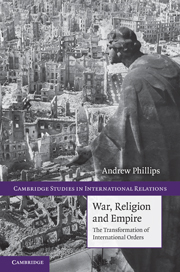Book contents
- Frontmatter
- Contents
- List of tables
- Acknowledgements
- Introduction
- PART I Conceptual framework
- PART II The historical transformation of international orders
- 3 The origins, constitution and decay of Latin Christendom
- 4 The collapse of Latin Christendom
- 5 Anarchy without society: Europe after Christendom and before sovereignty
- 6 The origins, constitution and decay of the Sinosphere
- 7 Heavenly Kingdom, imperial nemesis: Barbarians, martyrs and the crisis of the Sinosphere
- 8 Into the abyss: Barbarians, martyrs and the crisis of the Sinosphere
- 9 The great disorder and the birth of the East Asian sovereign state system
- PART III Contemporary challenges and future trajectories of world order
- Conclusion
- Bibliography
- Index
- Cambridge Studies in International Relations
5 - Anarchy without society: Europe after Christendom and before sovereignty
Published online by Cambridge University Press: 10 January 2011
- Frontmatter
- Contents
- List of tables
- Acknowledgements
- Introduction
- PART I Conceptual framework
- PART II The historical transformation of international orders
- 3 The origins, constitution and decay of Latin Christendom
- 4 The collapse of Latin Christendom
- 5 Anarchy without society: Europe after Christendom and before sovereignty
- 6 The origins, constitution and decay of the Sinosphere
- 7 Heavenly Kingdom, imperial nemesis: Barbarians, martyrs and the crisis of the Sinosphere
- 8 Into the abyss: Barbarians, martyrs and the crisis of the Sinosphere
- 9 The great disorder and the birth of the East Asian sovereign state system
- PART III Contemporary challenges and future trajectories of world order
- Conclusion
- Bibliography
- Index
- Cambridge Studies in International Relations
Summary
And ye shall overthrow their altars, and break their pillars and burn their groves with fire; and ye shall hew down the graven images of their gods, and destroy the names of them out of that place …
Deuteronomy 12:3With the conclusion of the Peace of Augsburg and the signing of the Peace of Cateau-Cambrésis four years later between the Valois and Habsburg crowns, the possibility of a return to order in Western and Central Europe momentarily presented itself. In officially recognising the empire's permanent religious division, the Peace of Augsburg constituted an explicit acknowledgement that Christendom's spiritual unity was lost beyond recall. Equally, while the terms of Cateau-Cambrésis naturally favoured the Habsburg victors, the Habsburg patrimony's division between the dynasty's Spanish and Austrian lines removed the possibility of reconstituting international order in Western Europe in an imperial form. With the struggle between Europe's two mightiest crowns momentarily in abeyance, and with both dynasties united alongside a revived post-Tridentine Church in their determination to eradicate heresy, the prospects for stability seemed promising.
As it transpired, the period between Cateau-Cambrésis and the Peace of Westphalia would prove one of exceptional violence, with the prior breakdown of Christendom's spiritual unity and its fundamental institutions paving the way for a protracted descent into immature anarchy. While the Augsburg Peace established an uneasy truce between Germany's warring confessions, elsewhere the hardening of confessional allegiances triggered a wave of religiously inspired revolts.
- Type
- Chapter
- Information
- War, Religion and EmpireThe Transformation of International Orders, pp. 107 - 148Publisher: Cambridge University PressPrint publication year: 2010



